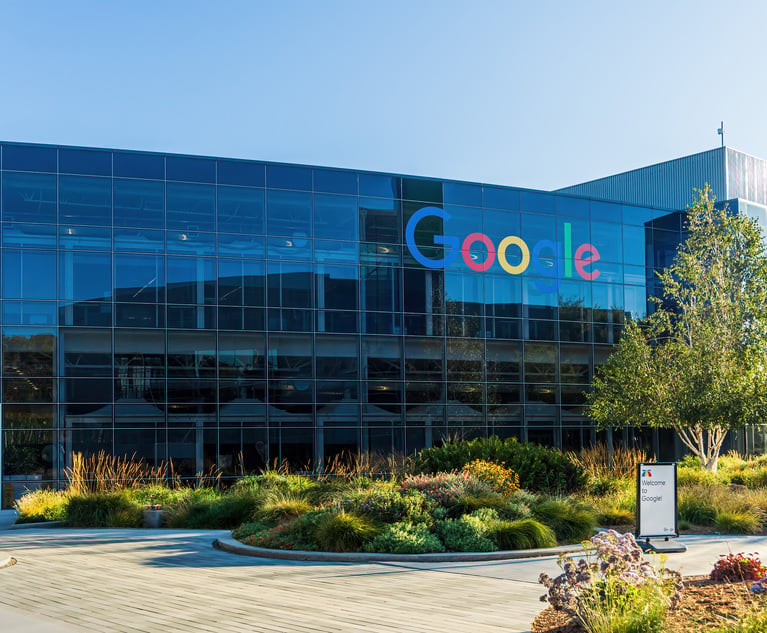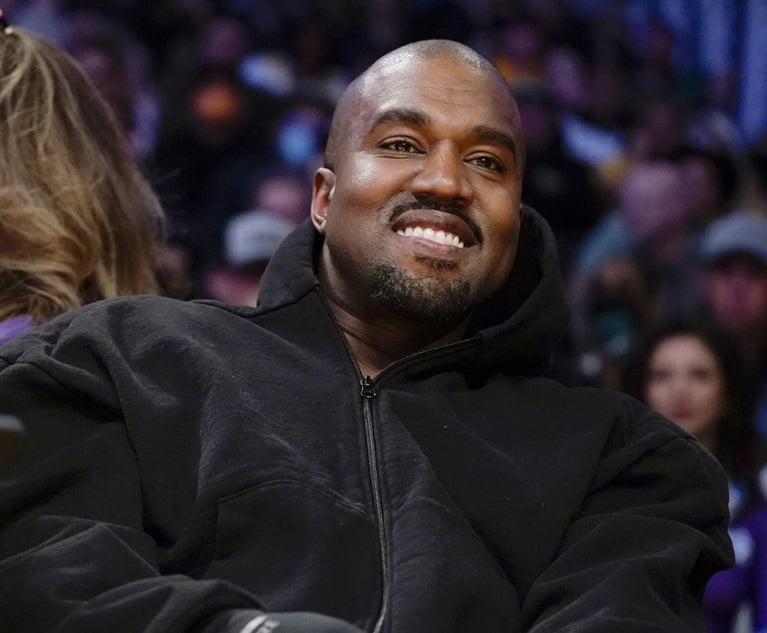 Image by Shutterstock
Image by ShutterstockCourt Rejects Claim That Driver's 'Neurobiological Response' to iPhone Text Caused Fatal Wreck
A federal appellate court has rejected a products liability claim against Apple alleging that a woman's neurobiological response to looking at a text message on her iPhone 5 while behind the wheel was the cause of a car crash that killed two people and paralyzed a child.
December 19, 2018 at 03:53 PM
4 minute read
The original version of this story was published on Texas Lawyer
The U.S. Court of Appeals for the Fifth Circuit has a rejected a products liability claim against Apple alleging that a woman's neurobiological response to looking at a text message on her iPhone 5 while behind the wheel was the cause of a car crash that killed two people and paralyzed a child.
The Fifth Circuit's decision in Meador v. Apple focuses on a 2013 wreck involving Ashley Kubiak, who was driving her pickup truck when she looked down to read a text message on her phone. She then turned her attention back to the road, but at that point it was too late, and the collision killed two adults and rendered a child paraplegic. Kubiak was later convicted of two counts of criminally negligent homicide.
Family members later sued Apple in Tyler, Texas federal court for negligence and product liability. The plaintiffs' complaint alleged that Apple, because of its concern over texting-while-driving accidents, had secured a patent covering a lockout mechanism for hand-held devices, but did not implement any version of the mechanism on the iPhone 5.
The plaintiffs also alleged that Apple failed to warn iPhone 5 users about the risks of distracted driving. Specifically, the plaintiffs cited studies and reports concluding that the receipt of a text message triggers in the recipient “an unconscious and automatic neurological compulsion to engage in texting behavior.”
Apple filed a motion to dismiss for failure to state a claim. And the Eastern District of Texas court later granted Apple's motion. The plaintiffs appealed to the Fifth Circuit.
In its decision on Dec. 18, the Fifth Circuit noted that no court in Texas has addressed whether a smartphone manufacturer can be held liable for a user's tortious acts because of a neurobiological response induced by a phone.
And because there was no guidance from Texas courts on the matter, the Fifth Circuit had to make a so-called Erie guess on how the Texas Supreme Court would rule in the case.
The Fifth Circuit found that the closest analogy in Texas civil law to the liability proposed by the plaintiffs is the state's dram shop law, which permits sellers of alcohol to be held liable for the torts committed by the intoxicated customers they serve. The court also noted that the dram shop law was the product of the Texas Legislature, a statute that was later vetted by state courts.
“To the extent there is a meritorious analogy between smartphone manufacturers and dram shops, it is for the state to explore, not us,” wrote Judge Stephen Higginson. “With the state not yet speaking to this issue, we note that the debilitating effects of alcohol have been recognized much longer than the effects of smartphones, and the proper regulation of the former has been debated much longer than the latter.
“Moreover, the law development that has occurred places the onus of distracted driving on the driver alone,” Higginson explained, referencing a 2017 law passed by the Texas Legislature that criminalizes reading, writing or sending a text message while driving.
“We therefore cannot say that Texas law would regard a smartphone's effect on a user as a substantial factor in the user's tortious acts. To say otherwise would be an innovation of state law that Erie does not permit us to make,” Higginson wrote. “Because we decline to consider 'neurobiological compulsion' a substantial factor under Texas law, we conclude that the iPhone 5 could not be a cause in fact of the injuries in this case.”
Greg Love, a Henderson attorney who represents the plaintiffs in the case, said his clients are considering their appellate options. A big issue in the case is whether Apple designed the iPhone 5 in a way that stimulates a user's brain function so that the phone would be used compulsively, he said.
“That's the issue that the Fifth Circuit identified as something they view as innovative,” Love said. “And that's the key issue in terms of liability, and that's what the trial court missed, in my opinion.''
Theodore J. Boutrous of Gibson, Dunn & Crutcher who represents Apple in the case did not return a call for comment.
This content has been archived. It is available through our partners, LexisNexis® and Bloomberg Law.
To view this content, please continue to their sites.
Not a Lexis Subscriber?
Subscribe Now
Not a Bloomberg Law Subscriber?
Subscribe Now
NOT FOR REPRINT
© 2024 ALM Global, LLC, All Rights Reserved. Request academic re-use from www.copyright.com. All other uses, submit a request to [email protected]. For more information visit Asset & Logo Licensing.
You Might Like
View All
Justices Seek Solicitor General's Views on Music Industry's Copyright Case Against ISP

Judge to Hear Arguments on Whether Google's Advertising Tech Constitutes a Monopoly
3 minute read
SEC Targets Rising Crypto Financier in $115 Million Securities Fraud
3 minute read
Trending Stories
- 1Revenue Up at Homegrown Texas Firms Through Q3, Though Demand Slipped Slightly
- 2Warner Bros. Accused of Misleading Investors on NBA Talks
- 3FTC Settles With Security Firm Over AI Claims Under Agency's Compliance Program
- 4'Water Cooler Discussions': US Judge Questions DOJ Request in Google Search Case
- 5Court rejects request to sideline San Jose State volleyball player on grounds she’s transgender
Who Got The Work
Michael G. Bongiorno, Andrew Scott Dulberg and Elizabeth E. Driscoll from Wilmer Cutler Pickering Hale and Dorr have stepped in to represent Symbotic Inc., an A.I.-enabled technology platform that focuses on increasing supply chain efficiency, and other defendants in a pending shareholder derivative lawsuit. The case, filed Oct. 2 in Massachusetts District Court by the Brown Law Firm on behalf of Stephen Austen, accuses certain officers and directors of misleading investors in regard to Symbotic's potential for margin growth by failing to disclose that the company was not equipped to timely deploy its systems or manage expenses through project delays. The case, assigned to U.S. District Judge Nathaniel M. Gorton, is 1:24-cv-12522, Austen v. Cohen et al.
Who Got The Work
Edmund Polubinski and Marie Killmond of Davis Polk & Wardwell have entered appearances for data platform software development company MongoDB and other defendants in a pending shareholder derivative lawsuit. The action, filed Oct. 7 in New York Southern District Court by the Brown Law Firm, accuses the company's directors and/or officers of falsely expressing confidence in the company’s restructuring of its sales incentive plan and downplaying the severity of decreases in its upfront commitments. The case is 1:24-cv-07594, Roy v. Ittycheria et al.
Who Got The Work
Amy O. Bruchs and Kurt F. Ellison of Michael Best & Friedrich have entered appearances for Epic Systems Corp. in a pending employment discrimination lawsuit. The suit was filed Sept. 7 in Wisconsin Western District Court by Levine Eisberner LLC and Siri & Glimstad on behalf of a project manager who claims that he was wrongfully terminated after applying for a religious exemption to the defendant's COVID-19 vaccine mandate. The case, assigned to U.S. Magistrate Judge Anita Marie Boor, is 3:24-cv-00630, Secker, Nathan v. Epic Systems Corporation.
Who Got The Work
David X. Sullivan, Thomas J. Finn and Gregory A. Hall from McCarter & English have entered appearances for Sunrun Installation Services in a pending civil rights lawsuit. The complaint was filed Sept. 4 in Connecticut District Court by attorney Robert M. Berke on behalf of former employee George Edward Steins, who was arrested and charged with employing an unregistered home improvement salesperson. The complaint alleges that had Sunrun informed the Connecticut Department of Consumer Protection that the plaintiff's employment had ended in 2017 and that he no longer held Sunrun's home improvement contractor license, he would not have been hit with charges, which were dismissed in May 2024. The case, assigned to U.S. District Judge Jeffrey A. Meyer, is 3:24-cv-01423, Steins v. Sunrun, Inc. et al.
Who Got The Work
Greenberg Traurig shareholder Joshua L. Raskin has entered an appearance for boohoo.com UK Ltd. in a pending patent infringement lawsuit. The suit, filed Sept. 3 in Texas Eastern District Court by Rozier Hardt McDonough on behalf of Alto Dynamics, asserts five patents related to an online shopping platform. The case, assigned to U.S. District Judge Rodney Gilstrap, is 2:24-cv-00719, Alto Dynamics, LLC v. boohoo.com UK Limited.
Featured Firms
Law Offices of Gary Martin Hays & Associates, P.C.
(470) 294-1674
Law Offices of Mark E. Salomone
(857) 444-6468
Smith & Hassler
(713) 739-1250






